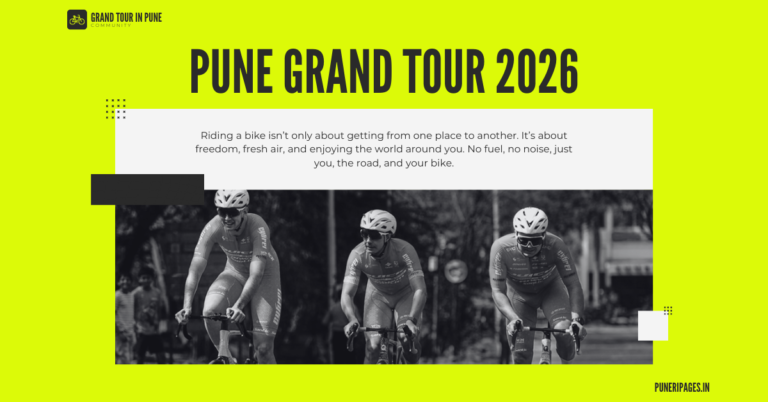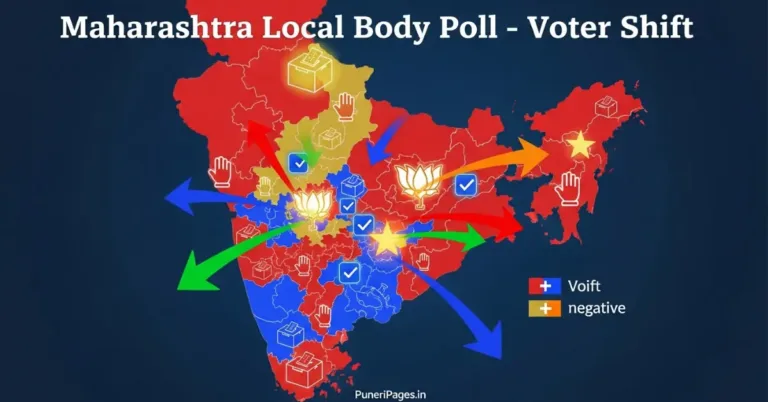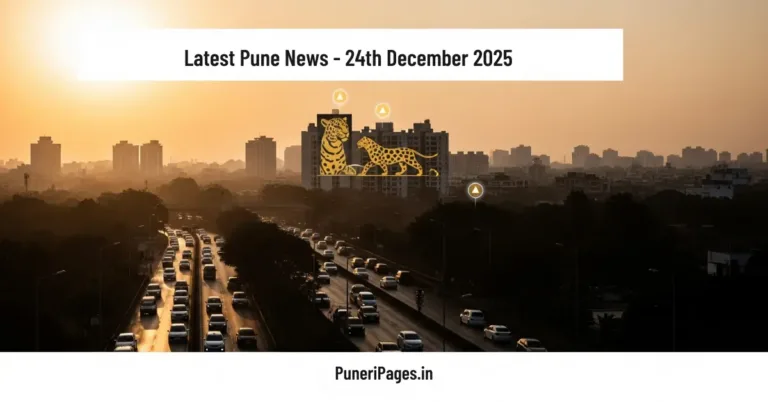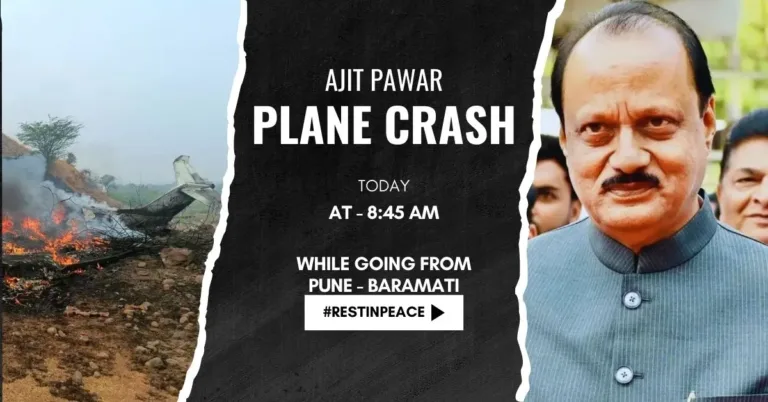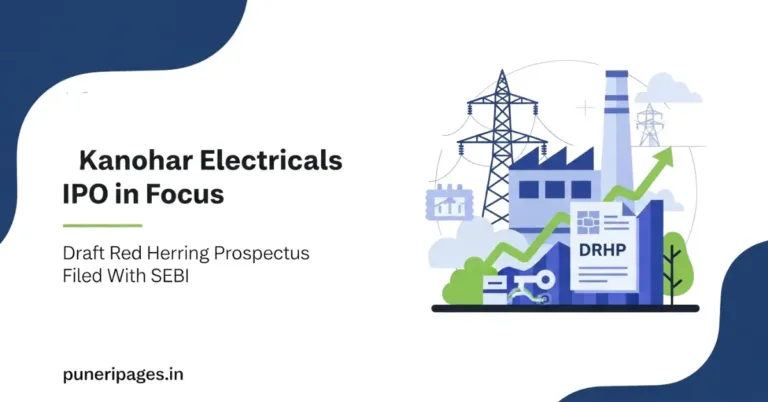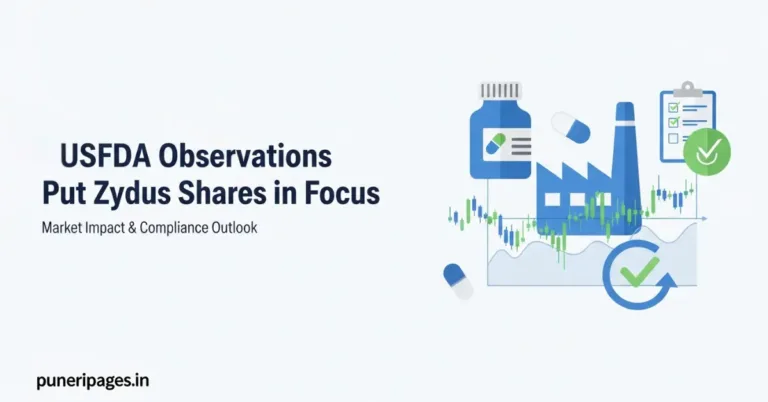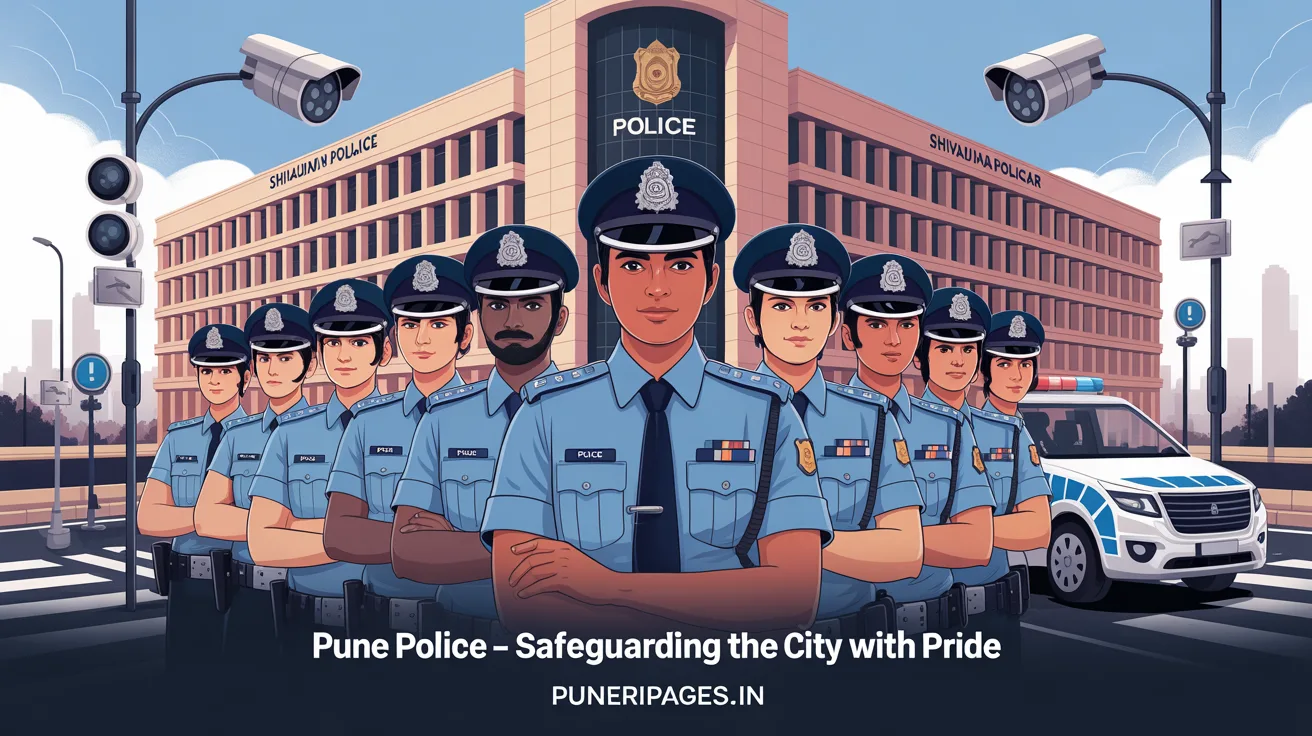
The Pune Police – Committed to service, community safety, and continuous improvement. Source: puneripages.in
Table of Contents
Pune’s law enforcement is managed by the Pune City Police Department (Pune Police), the city’s primary police force. Its origins trace back to the Maratha era: in 1764, Peshwa Madhavrao I created Pune’s first formal police post (Kotwal) and appointed Balaji Narayan Ketkar as the first Kotwal (city police chief). The modern Pune Police Commissionerate was established on 1 July 1965, and today serves ~7.3 million residents over ~790 km². The force emphasizes citizen services (helplines, e-challans, mobile apps) and technology (CCTV, AI traffic cameras) to improve safety. At the same time it faces challenges (rising cybercrime, traffic management, staffing) and public scrutiny. This article examines Pune Police’s history, structure, divisions (e.g. Cyber Crime Cell Pune, Women’s Cell, Traffic Police Pune, Crime Branch), services and community programs

Artist’s impression of the proposed new Pune Police Commissionerate (HQ) building, a modern “T”-shaped facility being designed to meet the city’s growing needs.
Historical Background
Policing in Pune dates back centuries. Under the Peshwa rulers of the Maratha Empire, a regular police office was first created in 1764. Balaji Narayan Ketkar became Pune’s first Kotwal (city police superintendent) and the city was divided into four Kotwal Chawdi police stations. British colonial rule brought further reforms: the Police Act of 1861 reorganized the force under new laws. By 1882, Pune District had 1,096 officers and constables, with costs and organization detailed in colonial records (e.g. annual cost about £18,962). After independence, Pune Police continued to evolve. The current Pune City Police Commissionerate (headquarters) was formally established on 1 July 1965. Over time, the jurisdiction expanded with Pune’s growth (merging nearby stations, then later separating Pimpri-Chinchwad). Today the department includes dozens of police stations and dozens of chowkies (outposts) covering the city and urban fringe.
Organizational Structure
The Pune City Police is headed by a Commissioner of Police, an IPS officer reporting to the Maharashtra Home Ministry. Amitesh Kumar, IPS (1995 batch), is the current Commissioner (appointed Jan 2024). Under the Commissioner, the force is organized into multiple layers: Joint and Additional Commissioners, Deputy Commissioners (DCPs), Assistant Commissioners (ACPs), and ranks down to constables. In total Pune Police has roughly 9,000 employees serving ~790 km²
- Zones and Regions:
Pune is divided into geographic zones. As of 2025 there are 5 city zones (Zone I–V), each headed by a DCP, overseeing a group of subdivisions and police stations. (A sixth zone was approved in 2025 for newly merged fringe areast.) Each zone splits into sub-divisions (headed by ACPs), and each subdivision has 3–4 police stations. In all, the Commissionerate covers roughly 30–39 police stations in Pune city (plus additional outposts). - Deputy Commissioners:
Currently the force has about 10 DCPs. Five DCPs command the five zones (covering ~39 stations). The other DCPs head key departments: one each leads the Traffic Branch (DCP-Traffic), Crime Branch (DCP-Crime), Special Branch, Police Headquarters, and the joint Economic Offences Wing (EOW) and Cyber Crime Cell. Plans are underway to add a dedicated Cyber DCP in future. - Staff Strength: Aside from DCPs, the structure includes about 1 Joint Commissioner of Police, 4 Additional Commissioners, 23 ACPs, 135 Police Inspectors, 570 ASIs/PSIs/APIs, and over 8,000 police personnelen.wikipedia.org. These personnel handle everything from law-and-order to traffic enforcement.
- Reporting: Pune City Police reports to the State police hierarchy (the DGP of Maharashtra), and coordinates with neighboring rural (Pune Rural Police) and nearby jurisdictions (e.g. Pimpri-Chinchwad City Police) on shared issues.
Specialized Divisions
Pune Police includes several specialized units to tackle specific challenges:
- Crime Branch:
This detective wing investigates major and organized crimes. It is headed by an Additional Commissioner (Crime) assisted by a DCP (Crime) and DCP (EOW/Cyber). The Crime Branch is subdivided into units focusing on different types of serious crime. In 2025 it comprised six major units and specialized squads (e.g. Anti-Extortion, Anti-Narcotics, Anti-Dacoity/Vehicle Theft squads). To proactively curb street crime, Pune has also formed city-wide mobile squads (patrolling teams) against chain-snatching, vehicle theft, burglaries and other thefts. (A recent proposal aims to add ~200 personnel to further bolster Crime Branch operations.) - Cyber Crime Cell Pune:
The Pune Police maintains a Cyber Crime Cell focusing on online frauds and digital offences. In 2024 it identified over 100 fraudulent mobile app links used by scammers to trick citizens (in cases of investment fraud, etc.). Senior Inspector Swapnali Shinde heads the Pune Cyber Cell. Currently the Economic Offences Wing also handles cybercrime cases, but authorities have noted the need for a dedicated cybercrime DCP. Training programs and public outreach (e.g. to schools and citizen groups) are being increased to fight rising cybercrime. - Women’s Cell and Bharosa Cell:
Pune Police has specialized units for crimes against women and vulnerable groups. Bharosa Cell (launched 2019) is a support center offering a unified helpline (1091) and services to women, children and senior citizens. It provides counseling, legal aid, police protection and medical help in one place. Under Bharosa, the Damini Squad (women marshals) patrol crowded areas and intervene in harassment cases; in 2020 Damini Marshals acted in 1,219 incidents involving threats to women. Pune also has a Women’s Grievance Cell at the Commissionerate, where senior officers counsel victims of domestic violence and register related cases. Additionally, a Senior Citizens Cell instructs officers to check on elderly citizens regularly. - Traffic Police Pune:
A dedicated Traffic Branch enforces road safety. It is headed by DCP-Traffic (east); plans are underway to add a DCP (Traffic) for west Pune as volumes grow. The branch issues e-challans for violations (see below). In 2025 the traffic police rolled out an innovative Pune Police Traffic App. Launched by a city minister, this smartphone app allows citizens to report illegal parking, triple-seating, wrong-way driving, and road obstructions (like accidents or breakdowns) with photos/videos. Each report is verified and can result in instant e-challans. The traffic branch also coordinates new tech solutions (see below) and public education on road discipline. - Special Branch & Others:
Other divisions include the Special Branch (intelligence and VIP security) and units like the Bomb Disposal, Dog Squad, etc. (Each is headed by officers reporting to the Commissioner.) The Economic Offences Wing (EOW) investigates white-collar crime and currently also covers major financial frauds (with its DCP also handling cyber cases).
Public Services and Citizen Portals
Pune Police provides many services and channels to citizens:
- Emergency Helplines:
For immediate police assistance, citizens can dial 100 (state police) or the national emergency number 112. Pune also promotes helplines for vulnerable groups (e.g. 1091 for women via Bharosa, 1090 for senior citizens). - E-Challan System:
Traffic fines are issued electronically. Maharashtra’s Traffic E-Challan portal/app lets drivers pay fines online. Pune’s traffic police use cameras and handheld devices to detect violations; an e-challan (digital fine) is automatically sent to the violator’s mobile/email. - Mobile Apps:
Beyond the Traffic App, Pune Police has explored other mobile tools. For example, a citizen app was introduced (2025) to report any traffic or road issues to police in real time. The force also offers resources through mobile-friendly portals (e.g. reporting lost items, checking status of FIRs via national CCTNS portals). - Online Portals:
The Maharashtra Police’s CCTNS citizen portal enables online filing of complaints (missing person reports, FIR searches, etc.). Pune Police launched an official website (punepolice.gov.in) and social media channels (Twitter @PuneCityPolice, Facebook) to engage with the public. These platforms disseminate alerts, safety tips and allow citizens to raise grievances digitally. - Other Services:
Pune Police runs programs like “Citizen Assistance Centres” at stations for quick services (character certificates, license verifications), “Lost & Found” desks, and periodic medical/aid camps. Escort services (e.g. Police Didi for women late-night work shifts) and Quick Response Teams (for rapid incident response) are also part of public service.
Technology and Modern Initiatives
Pune Police has aggressively adopted technology:
- Citywide CCTV Network:
As of 2025, the department is installing ~2,900 new CCTV cameras across the city. These will cover roads, school zones, slums, hill roads, etc., vastly expanding surveillance. Some cameras will be AI-enabled (for automatic detection of incidents) and integrated with Pune’s Smart City traffic management. The goal is to deter crime and monitor traffic 24×7. - AI Traffic Enforcement:
Pune piloted AI-based cameras on Ferguson College Road (a busy thoroughfare) to detect illegal parking and wrong-way driving. These smart cameras (in collaboration with Sensen AI) automatically recognize violations: a car parked in a no-parking zone is displayed on-screen, given a minute to move, and then e-challaned without human intervention. Similar AI parking-detection cameras are being installed on Airport Road and other hotspots. These systems minimize manual workloads and help enforce discipline. Early trials in 2025 showed hundreds of violations caught in days. - AI and Software Systems:
The traffic branch also launched an AI-driven “Violation Detection” system (May 2025), and Pune is among the first cities using AI for traffic rules enforcement. Plans include integrating CCTV feeds with Automated Traffic Management (ITMS) systems. On the police side, Pune participates in state/national police IT networks (CCTNS, crime intelligence databases) to share data in real-time. - Social Media & Apps:
Pune Police maintains active Twitter and Facebook accounts (@PuneCityPolice) for announcements. It also launched a revamped website with e-services and launched mobile apps for citizen engagement. For example, in 2025 Pune debuted the “Pune Police Traffic App” (PTP Traffic Cop) – allowing law-abiding citizens to report violations or issues and receive live traffic info.
Community Engagement
Pune Police emphasizes community policing through multiple outreach programs:
- Mohalla (Neighborhood) Committees:
Local ward-level committees (peace committees) exist in Pune, bringing residents and officers together to address area-specific issues. They facilitate two-way communication and help resolve grievances at the grassroots. - Bharosa Cell:
As noted, Bharosa offers multi-agency help to women, children and the elderly under one roof. It expands the Women’s Grievance Cell into a full support service. - Police Kaka/Didi:
Senior officers are assigned as “police uncles/aunties” to colleges and schools. These Police Kaka/Didi mentors counsel students on safety (against ragging, eve-teasing, cybercrime, etc.) and encourage them to report problems. - Buddy Cop & Alert Citizen:
Under “Buddy Cop,” police volunteers or officers pair up to ensure late-night security for working women (especially IT sector). “Alert Citizen” groups – trained community volunteers – assist police with patrolling and reporting suspicious activities (modeled after Mumbai’s Safer Cities initiatives). - Senior Citizens’ Cell:
Officers conduct home visits to senior citizens, helping resolve disputes or safety concerns. This scheme acknowledges issues faced by isolated elderly in nuclear families. - Self-Defense Training:
While sources are scarce, Pune Police regularly conducts self-defense workshops for women and girls. On special occasions (e.g. Women’s Day), police trainers give martial-arts sessions at schools and community centers to empower women to protect themselves.
These community programs aim to build trust and crime prevention. In fact, a 2019 state directive urged all police units (including Pune) to standardize community schemes (like Mohalla Committees, Mahila Samitis, Buddy Cop, etc.).
Recent News and Developments
Several notable developments have occurred recently:
- Leadership & Expansion:
In early 2024, Amitesh Kumar took charge as Pune’s Commissioner. In 2025, police proposed creating six new DCP posts to handle urban growth. A new Zone VI (DCP-led) is being carved out to cover booming suburbs (e.g. Pune-Ahmednagar Road areas). Seven new police stations were also opened in 2024 to improve coverage. - Crime Branch Restructure:
March 2025 saw approval for strengthening the Crime Branch (adding 200 posts). This includes specialized squads and patrol teams against street crimes and organized gangs. - Infrastructure:
As highlighted earlier, designs are finalized for a new Rs.193-cr Pune Police HQ building. The state approved funds in 2024, and construction of this green-designed “T”-shaped commissionerate is expected to begin soon. - Technology:
Pune Police continuously pilots tech: e.g. in May 2025 it launched the AI-based traffic camera system and the citizen Traffic App. In Jan 2025 it announced plans to deploy 2,886 new CCTV cameras citywide. - Public Feedback:
On social media, official appeals sometimes spark citizen debate. For instance, a July 2024 tweet urging traffic patience drew comments complaining about lax enforcement on roads. Such feedback underscores public expectations on policing.
Challenges and Public Perception
Despite many initiatives, Pune Police faces ongoing challenges. An acute issue is cybercrime: in 2017 Pune’s Commissioner admitted that rising online frauds are “the biggest challenge”. Rapid tech change demands skilled staff – an officer noted that one inspector (and ~100 cyber staffers) could not handle all cases, and more trained officers are needed.
Traffic enforcement and manpower are other pain points. Citizens often remark on the lack of visible patrols on Pune’s congested roads. A 2024 TOI report quotes residents saying wrong-side drivers and illegal parkers act with impunity due to absent enforcement. Critics also allege corruption: one Pune citizen complained “only those who can’t afford to grease palms get fined”. Incidents of police misconduct (a viral video of a cop assaulting a bus driver) have dented trust among some citizens.
On the positive side, many commend Pune Police’s modernization and outreach. The Bharosa Cell and helplines are seen as valuable services for women and families. Traffic apps and e-challans are appreciated by law-abiding drivers. Studies of Indian city police (though data on Pune is limited) often rank Pune Police as professional compared to some peers. Overall, media and citizens view the force as relatively well-managed but urge accountability, better resource allocation, and continued community engagement.
Conclusion
The Pune Police has a long legacy and plays a critical role in maintaining law and order in a rapidly growing city. Its achievements – from creating the Bharosa women’s center and Crime Branch squads to deploying new CCTV and AI systems – showcase innovation in policing. At the same time, challenges remain: evolving cyber threats, chronic traffic violations, and constraints on manpower and funds. Ongoing efforts (new HQ building, staffing expansions, tech pilots) aim to address these gaps. A balanced view recognizes Pune Police’s commitment to service and safety, while noting areas for improvement. As Pune continues to expand, the police force will need to adapt – enhancing community trust and leveraging technology – to keep the city safe and responsive to all citizens’ needs.
Key Takeaways:
The Pune Police has a long legacy and plays a critical role in maintaining law and order in a rapidly growing city. Its achievements – from creating the Bharosa women’s center and Crime Branch squads to deploying new CCTV and AI systems – showcase innovation in policing. At the same time, challenges remain: evolving cyber threats, chronic traffic violations, and constraints on manpower and funds. Ongoing efforts (new HQ building, staffing expansions, tech pilots) aim to address these gaps. A balanced view recognizes Pune Police’s commitment to service and safety, while noting areas for improvement. As Pune continues to expand, the police force will need to adapt – enhancing community trust and leveraging technology – to keep the city safe and responsive to all citizens’ needs.
Sources: Official Pune Police records and recent news reports were used to compile this overview. These provide factual details on history, organization, initiatives, and community feedback.
FAQs about Pune Police
Q1: How can I contact the Pune Police in an emergency?
A: You can dial 100 or 112 for immediate police assistance. For women, call 1091. For senior citizens, call 1090.
Q2: How can I report a cybercrime in Pune?
A: You can report online frauds to the Pune Cyber Crime Cell or use the National Cyber Crime Reporting Portal (cybercrime.gov.in).
Q3: What is the Bharosa Cell?
A: Bharosa Cell is a support center by Pune Police that offers counseling, legal help, and police protection to women, children, and senior citizens under one roof.
Q4: Where can I pay my traffic challan issued by Pune Traffic Police?
A: You can pay your e-challan online via the Maharashtra Traffic Police portal or through apps like MahaTraffic or PayTM.
Q5: How do I report a missing person or file an FIR online in Pune?
A: You can file an FIR or report a missing person online via the CCTNS Citizen Portal or visit your nearest police station.
Q6: Does Pune Police have a mobile app?
A: Yes, Pune Police offers the PTP Traffic Cop app for reporting traffic violations and receiving updates. More apps may be added soon.
Q7: Who is the current Pune Police Commissioner?
A: As of 2025, the Commissioner of Pune Police is Amitesh Kumar, IPS.
Q8: What is the jurisdiction area of the Pune City Police?
A: The Pune City Police covers over 790 square kilometers and serves a population of approximately 7.3 million.
Q9: Are Pune Police stations open 24 hours?
A: Yes, all police stations in Pune operate 24/7 for emergency support and reporting.
Q10: How do I file a complaint about police misconduct?
A: You can file a complaint with the Pune Police Commissioner’s office, the Maharashtra State Human Rights Commission, or use the Lokshahi Din mechanism.
Q11: What is Lokshahi Din?
A: Lokshahi Din is a grievance redressal forum where citizens can directly present their complaints to senior police officials every month.
Q12: Does Pune Police offer services for senior citizens?
A: Yes, Pune Police has dedicated helplines and support officers for senior citizens under the Bharosa Cell and Beat Marshals.
Q13: What is the role of Police Kaka and Police Didi?
A: They are outreach officers assigned to schools and colleges to prevent youth crimes and provide guidance to students.
Q14: How can I volunteer or assist the Pune Police as a citizen?
A: Citizens can join neighborhood Mohalla Committees or partner with traffic volunteers and community policing units.
Q15: Is Pune Police active on social media?
A: Yes, they regularly post updates, alerts, and engagement content on Twitter (@PuneCityPolice), Facebook, and Instagram.
